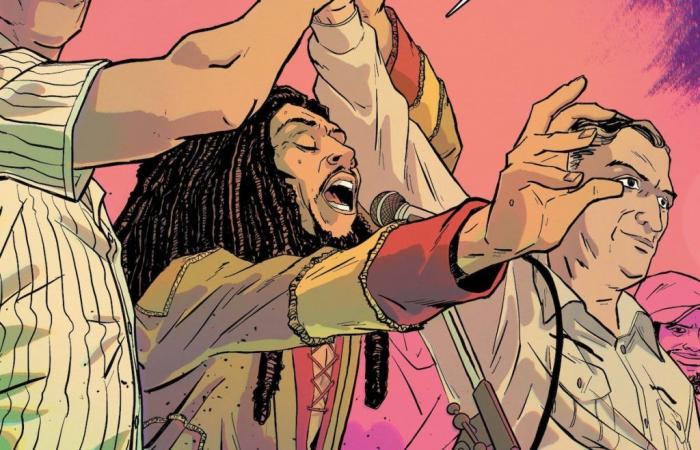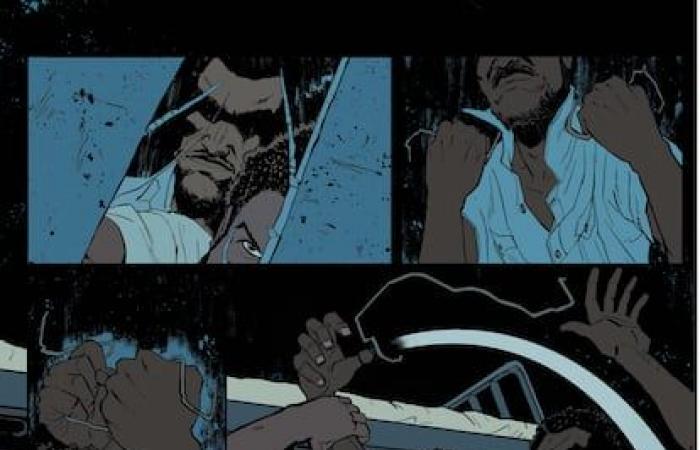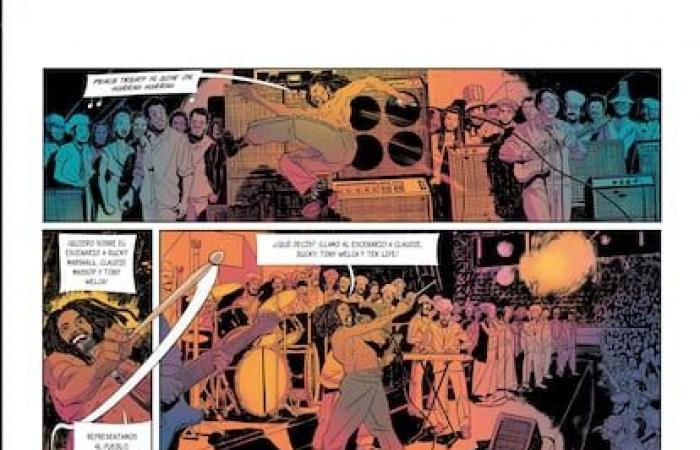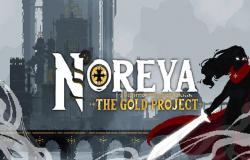The One Love Peace concert, held on April 22, 1978 at the National Stadium in Kingston, was a historic event. On the same stage, Jamaican Prime Minister Michael Manley and opposition leader Edward Seaga joined hands with Bob Marley to express their desire for harmony and dialogue. The gesture had substance: until then the followers of the People’s National Party (PNP) in Government and the opposition Jamaica Labor Party (JLP) were fiercely opposed. In the international context of the Cold War, with Fidel’s Cuba as a close neighbor, Manley was accused of developing his particular path towards “democratic socialism.” As if that were not enough, there was also an open war between rival gangs in the streets. Bucky Marshall and Claude Massop were the leaders of that conflict that tore the population apart in a spiral of violence that had caused Bob Marley to go into exile in London after being shot in his house two years earlier.
The comic once upon a time in jamaica. How Kingston gangsters made peace with the help of Bob Marley (FlowPress, 2024) tells how the event was organized, the process that was experienced until obtaining that photograph of unity and the expertise of the gang member Claude Massop to seduce the greatest number of artists of reggae for them to participate. With a script by the Frenchman Loulou Dedola and drawings by the Italian Luca Ferrara, the story is told at a frenetic pace that initially confuses the reader if he is not familiar with the intra-history of one of the totemic concerts of the 20th century. An event that brought together more than 30,000 people in a festival that began at five in the afternoon and ended with the photograph of politicians and gangsters united on stage almost 12 hours later. On one of the first pages, Dedola and Ferrara begin with the statement of a police officer that clarifies the context of the moment on the Caribbean island quite a bit: “Politics and gangs go hand in hand.”
Claude Massop supported Seaga’s party and Bucky Marshall supported Manley’s ruling party. Each managed their own territory and the war between both sides was loaded with testosterone, marijuana trafficking and shrapnel in abundance. In the middle of this chaos, the emergence of reggae and the rasta philosophy led by Bob Marley was on the rise, the profusion of bands and artists on the island was colossal and the rhythms derived from ska and rocksteady They were spreading beyond Jamaica, especially in the British metropolis.
In 1978 Bob Marley was already an international celebrity and his figure generated enormous expectation. A follower of the Ethiopian emperor Hailè Selassiè, his music had broken borders and his songs were hymns that appealed to feelings of brotherhood. Representative of what is now called the Global South, Marley’s magnetic energy cast a messianic shadow over his followers. Within the island, his return was considered a hopeful gesture because Marley had precisely left the island for fear of a new attack. In the first attempt, unknown gunmen, allegedly linked to the opposition JLP, shot him and wounded him in the chest and arm. At the peace concert, in addition to Bob Marley with his band The Wailers, among others, Althea and Donna, Jacob Miller, Dennis Brown, Big Youth, Beres Hammond, Culture, Junior Tucker, U-Roy, Ras Michael and the Sons of Negus or the immeasurable Peter Tosh.
The gesture of Michael Manley, Edward Seaga, Bucky Marshall and Claude Massop in the middle of a cloud of marijuana and with Bob Marley as a conciliatory agent had a lot of symbolism but little travel. The concert wanted to celebrate the end of the massacres and the visit to Jamaica, exactly 12 years earlier, of the Ethiopian leader Haile Selassie, considered a deity by Rastas. But the good vibes did not last long, the truce was broken a few weeks later, blood once again flooded the streets of Kingston and the political confrontation, far from attenuating, became even more heated. In February 1979, Claude Massop was shot dead by police while walking near his neighborhood. A few weeks later, Bucky Marshall was murdered in a New York nightclub, where he had taken refuge from the violence in his country. The bands regenerated his leadership and in turn Bob Marley would disown both politicians and would become even more enclosed in his Rastafarian spirituality. The singer died in 1981 at the age of 36, a victim of cancer for which he did not want to be treated.
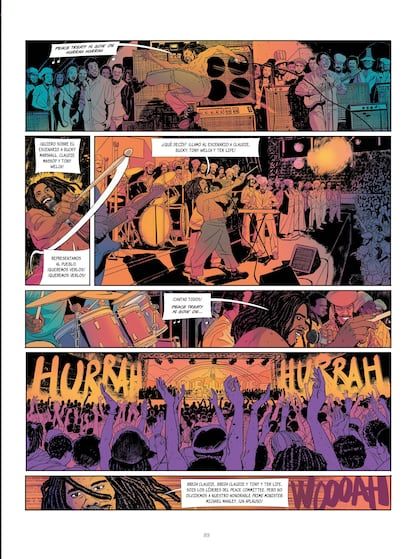
Despite his early death, Marley is one of the most enduring musicians of all time and his life remains a matter of interest. Last February it was released in theaters Bob Marley: One Love, a biographical film directed by Reinaldo Marcus Green and starring actor Kingsley Ben-Ad. In addition, his music remains in excellent shape, in March 2024 the number of albums sold was 145 million according to the portal specialized in the music industry ChartMaters. The comic by Loulou Dedola and Luca Ferrara, which includes a great list of songs and links to videos to accompany the reading, allows us to learn more about an artist whose pacifist message and liberating referentiality does not expire no matter how much the governments of the world They insist on embracing the cause of war and social injustices.
Bob Marley still sounds strongly in the heads of fans of a genre, the reggae, which has branches in all countries around the globe. Although that photograph aged poorly and soon, at least on April 22, 1978 at the National Stadium in Kingston, those gathered there believed in the pacifying power of music, love and weed.
All the culture that goes with you awaits you here.
Subscribe
Babelia
The literary news analyzed by the best critics in our weekly newsletter
RECEIVE IT
Subscribe to continue reading
Read without limits
_

